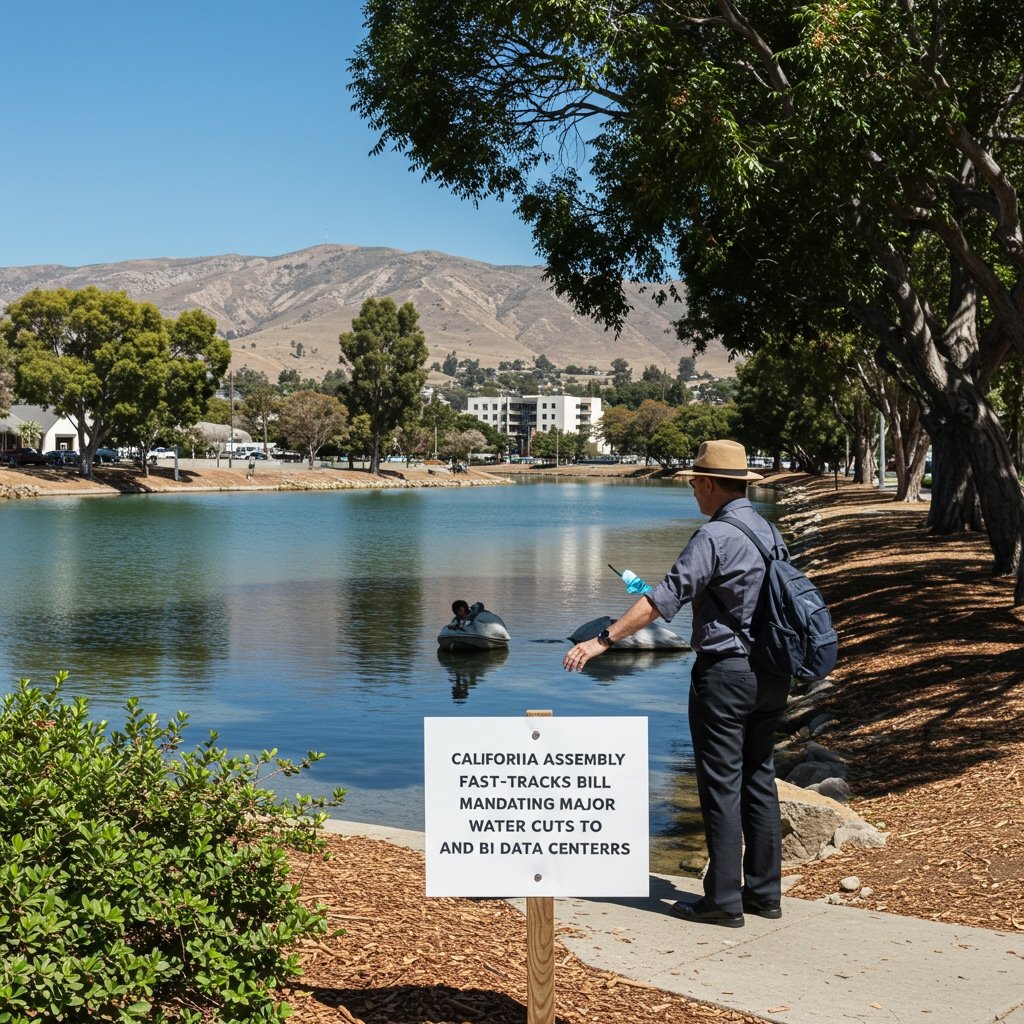California Legislature Targets Tech Water Use Amidst Drought Concerns
SACRAMENTO, CA – California legislators are moving swiftly on a new measure poised to significantly alter how large corporate entities, particularly the state’s burgeoning data center industry, manage their water consumption. Assembly Bill 215 (AB 215), championed by Assemblymember Lena Torres (D-San Jose), is currently being fast-tracked through the legislative process, highlighting the urgency placed on addressing water usage by major commercial facilities across the state. The bill, recently advanced by the Assembly Environment Committee, introduces stringent new requirements aimed at curbing the substantial water footprints associated with large campuses and data center operations.
The core of AB 215 mandates a significant reduction in water usage for facilities exceeding 100,000 square feet. Under the proposed legislation, these large commercial properties would be required to decrease their total water consumption by a substantial 30% by the year 2030. This target is set against a baseline measurement of their water use in 2024, establishing a clear benchmark for compliance over the next six years.
Assemblymember Torres’s office states that the bill is a necessary step in safeguarding California’s precious water resources, especially in an era of increasing climate variability and the persistent threat of severe drought. “California’s future depends on sustainable water management,” Assemblymember Torres reportedly stated during a committee hearing, emphasizing the need for all sectors, including large corporations, to contribute meaningfully to conservation efforts. “Large facilities, particularly those with intensive cooling needs like data centers, represent a significant portion of industrial water demand. AB 215 sets a clear, achievable target to ensure they become part of the solution.”
The focus on data centers is particularly relevant. These facilities, essential infrastructure for the digital economy, require vast amounts of energy and often use water-intensive cooling systems to prevent servers from overheating. As demand for cloud computing, artificial intelligence, and online services continues to grow, so does the physical footprint and resource consumption of these digital hubs. Environmental advocates have increasingly raised concerns about the potential strain on local water supplies posed by the proliferation of data centers, especially in regions already grappling with water scarcity.
Supporters of AB 215, including numerous environmental organizations, have lauded the bill as a critical and overdue action. They argue that the 30% reduction target by 2030 is an aggressive but necessary step to ensure California’s resilience in the face of future droughts and climate change impacts. Environmental proponents emphasize that large corporations have a responsibility to minimize their environmental impact and that mandating water efficiency is a fair expectation given the scale of their operations. They view the fast-tracking of the bill through the Assembly Environment Committee as a positive sign of legislative commitment to prioritizing water conservation.
However, the proposed mandate has met with considerable resistance from industry groups. The Silicon Valley Tech Council, representing numerous technology companies operating large facilities in California, has voiced strong opposition to AB 215. The Council argues that the 30% reduction target by 2030 from a 2024 baseline is unfeasible within the proposed timeframe. They contend that achieving such a significant reduction would require substantial capital investment in new cooling technologies and infrastructure, potentially disrupting operations and hindering technological innovation.
According to a statement released by the Silicon Valley Tech Council, while their member companies are committed to water conservation, the targets set by AB 215 are unrealistic and could place California at a competitive disadvantage. “Our members are constantly exploring and implementing water-saving technologies,” the statement read. “However, a mandated 30% reduction in just six years for large, complex facilities poses immense technical and financial challenges. We believe a more phased approach, developed in collaboration with the industry, would yield more sustainable and practical results.”
The Council also raises concerns about the potential economic impact, suggesting that the cost of compliance could deter companies from expanding or even maintaining their presence in California, potentially leading to job losses or slower economic growth in the state’s vital technology sector. They advocate for incentive-based programs and public-private partnerships rather than what they describe as punitive mandates.
The bill’s rapid movement through the Assembly Environment Committee indicates a strong impetus within the legislature to address corporate water usage directly. The fast-tracking suggests that lawmakers see this as a pressing issue requiring urgent action, possibly driven by the memory of recent severe droughts and projections for future water availability. The committee’s approval means AB 215 is now poised for further consideration, potentially heading towards a vote on the Assembly floor.
The debate surrounding AB 215 encapsulates the larger tension between environmental protection goals and the operational realities and economic concerns of major industries. While environmental advocates see the bill as a crucial step towards sustainable resource management and drought preparedness, the technology sector views the mandates as overly ambitious and potentially detrimental. The legislative journey of AB 215 will reveal how California seeks to balance these competing interests as it grapples with the critical challenge of securing its water future.


















